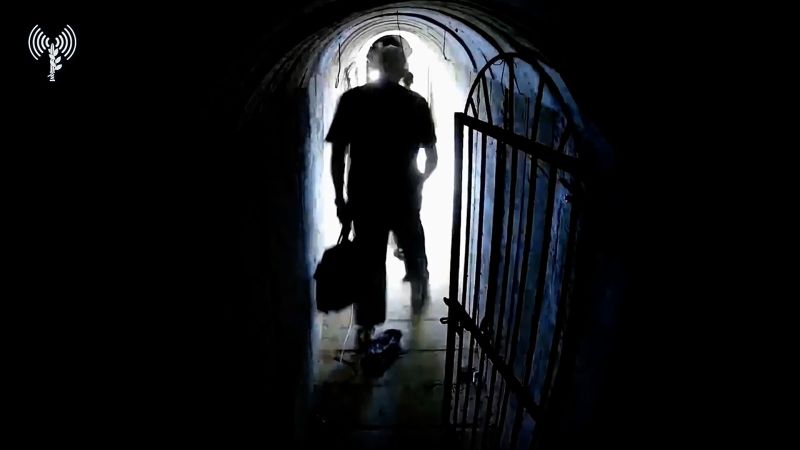
Israel releases video purportedly showing Hamas leader Sinwar in tunnel under Khan Younis
The Israeli military released a video that purportedly shows the Hamas leader Yahya Sinwar inside a tunnel below the southern Gaza city of Khan Younis, with his wife, children and his brother Ibrahim Sinwar.
Israel has publicly accused Sinwar of being the “mastermind” behind Hamas’ terror attack against Israel on October 7 – though experts say he is likely one of several – making him one of the key targets of its war in Gaza.
Unveiling the video at his daily press conference, Israel Defense Forces (IDF) spokesman Daniel Hagari said the footage had been captured on a Hamas CCTV camera on October 10 and obtained by the IDF in recent days.
“That’s how he escaped with his family underground in a tunnel to one of the safe accommodation complexes he had built in advance,” Hagari continued.
Hagari added that the video was a “result of our hunt” for Sinwar and that “the hunt will not stop until he is captured, dead or alive. We are determined to capture him. We will capture him.”
Sinwar has been described as Israel’s most-wanted man in Gaza. The Israeli military has declared him a “dead man walking,” nicknaming him in one profile as “the Butcher from Khan Younis” for his alleged role in planning the October 7 attack.
In December, the IDF surrounded Sinwar’s house but did not find him, saying then that he was believed to be hiding underground. An adviser to Israeli Prime Minister Benjamin Netanyahu said subsequently that it was “only a matter of time before we get him.”
However, Sinwar has remained elusive, despite an intensive Israeli assault on Khan Younis, his hometown.
On February 6, the IDF said it was still pursuing Sinwar’s whereabouts – and those of other leaders of the militant group in Gaza, with Brig. Gen. Dan Goldfuss, the commander of the IDF’s 98th Division, saying he was confident his troops would “get them.” At the time, he did not respond when asked whether he could say with confidence that Sinwar was still in Gaza.
The IDF also released a second video which they said showed Israeli forces in a section of the Hamas tunnels where they believe Sinwar was hiding.
In the video, a soldier whose face is blurred says that they are at the “main hiding place” of Sinwar and claims that the Hamas leader was there in “recent times.” The video also shows a bathroom, a kitchen and bedrooms, and the soldier says troops also found “millions of shekels and dollars in the safe and other funds that are scattered here outside.”
“They fled when they heard that the IDF was approaching them. They knew we were coming so they fled,” the soldier says in the video.
Longtime Hamas figure
A longtime figure in the Islamist Palestinian group, Sinwar was responsible for assembling Hamas’ military wing before forming important new ties with regional Arab powers as the group’s civilian and political leader.
He was elected to Hamas’ main decision-making body, the Politburo, in 2017 as the political leader of Hamas in Gaza branch. However, he has since become the Politburo’s de facto leader, according to research by the European Council on Foreign Relations (ECFR).
He has been designated a global terrorist by the US Department of State since 2015, and has been recently sanctioned by the United Kingdom and France.
The IDF have intensified attacks on central and southern Gaza in recent weeks, including in Khan Younis – an area to which the Israeli military had previously urged large numbers of civilians to flee in the early days of the war, when northern Gaza was the focus of Israel’s operations.
The Israeli military has long claimed Khan Younis is a major Hamas stronghold, alleging that a tunnel network underneath civilian buildings in the city was likely where Hamas planned the October 7 attacks.
Israel launched its military campaign in Gaza after the Hamas attack on October 7, in which more than 1,200 people were killed and over 240 taken hostage. Netanyahu has previously said the campaign is needed to “destroy Hamas’ capabilities.”
Since then, Israel’s bombardment and besiegement of the enclave has razed entire neighborhoods, diminished critical supplies and left some 2.2 million Palestinians exposed to high levels of acute food insecurity or worse, dehydration and deadly disease.
At least 1.7 million people have been forcibly displaced, according to the UN’s Office for the Coordination of Humanitarian Affairs. Israeli attacks on the enclave have killed at least 28,340 people and injured at least 67,984, according to the Ministry of Health in Hamas-run Gaza.
This is a developing story and will be updated.
